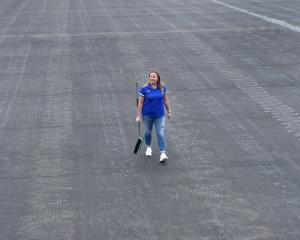The Otago Rescue Helicopter Trust says a ''dramatic'' 30% increase in demand is partly a result of the service picking up the slack as St John struggles to find volunteers.
This was disputed by St John district operations manager Southland Otago Pauline Buchanan yesterday, who said St John was ''disappointed'' with the trust's comments.
''Volunteer recruitment is an ongoing issue and St John does not deny that there are challenges.
''However, St John does not agree that our volunteer levels are the reason for any supposed increase in the rescue helicopter's work.
''It is more likely the trust's own ability and willingness to take on work,'' Ms Buchanan said.
This comes after the trust's annual report for the year to June showed flight hours had increased by 29.8% over the previous year and the number of missions by 25%.
In the report and at a presentation at yesterday's Otago Regional Council meeting, the trust singled out two reasons for the increase, which had proved a ''massive challenge'' for the trust and resulted in fatigued staff.
One was a growing number of patients having to be transported outside Otago for specialist care and the other was as a result of St John's struggle to maintain volunteer crew numbers, especially in remote areas.
''As a result of the lack of road transport in these areas, the helicopter is increasingly being used as the next best option, or, in some instances due to resource constraints, the only option,'' trust manager Ken Franklin said in the report.
At the meeting, trust chairman Ross Black said St John was increasingly reluctant to send its ambulances on jobs that required long-distance travel.
''When you are struggling to staff your ambulances in your region and to serve your region you don't want that only crew that you have got on duty to get into an ambulance and drive a patient in need of advanced care all the way to Dunedin and all the way back again,'' Mr Black said.
Earlier, Mr Black said the increase in flight hours had presented a ''massive challenge'' for the trust.
''It was unexpected by us, it was unexpected by the Ministry of Health and it was certainly unexpected by ACC.''
He emphasised the helicopter crews had still managed to respond to every call despite the ''spectacular growth''.
Helicopters Otago Ltd managing director Graeme Gale said dealing with the increase day-to-day was ''not easy''. The ''biggest challenge'' was managing the long hours put in by pilots and the medical crew.
''Fatigue has been a big issue to manage,'' he said.
Ms Buchanan said St John worked closely with the Otago Rescue Helicopter and was responsible for dispatching it to jobs.
''They are dispatched when the clinical requirements of a particular incident would benefit from the intensive care paramedic on the helicopter being sent to the incident, to provide a higher level of patient care.''
It was not done ''merely to provide a transportation option for a patient''.
''We will be discussing this matter further with the Otago Rescue Helicopter Trust. However, we do make it clear that we are disappointed in the picture they have given to the Otago Regional Council.''
Other highlights from the annual report included. -
The trust had a deficit of $57,000 for the year to June, which was funded from its reserves.
Income from donations increased by 63% to $1.17million.
From 2018 the trust's role will change and a new structure will mean more control for the Ministry of Health and ACC.
A new helicopter was bought midway through last year and New Zealand-first technology meant the trust's helicopters could fly in conditions which would have prevented them flying in the past.












